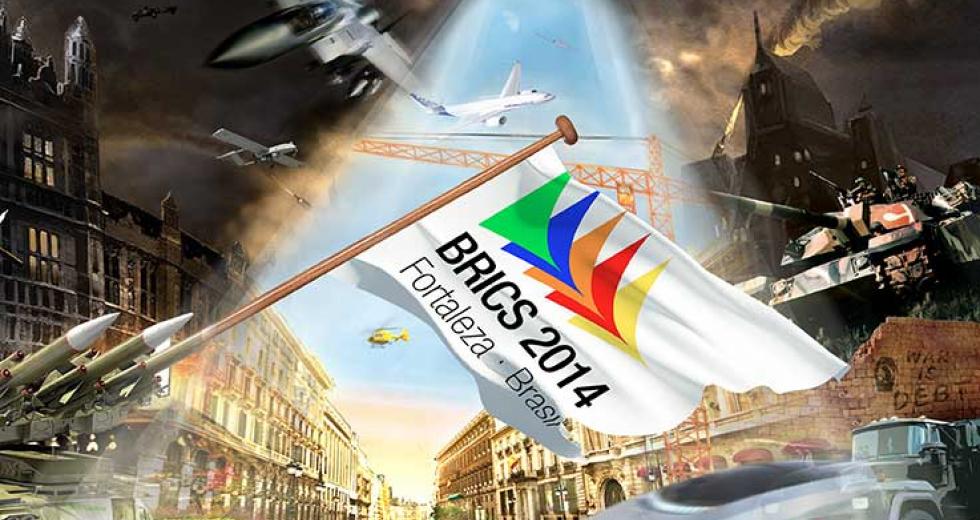
Many of those who have been warning of impending financial armageddon have also said that it has been, and is being, deliberately engineered. I have some sympathy with that position. However, increasingly it becomes apparent that it is more of the case that those who are running the City of London/Wall street oligarchy are simply incapable of imagining, through their psychopathic haze, any other way of doing things.
While there have been many in the “alternative media” offering warnings, there has been a smaller set of voices offering solutions. People must be bored by now of the mantra “Glass Steagall and the Bradbury Pound”, and yet, while no-one was looking, half the world has taken up that very policy and are using it to defeat the genocidal tendencies of the City of London.
In the middle of July, the leaders of five nations met in Fortaleza, Brazil, for the sixth BRICS Summit. The five nations were the hosts, Brazil, with Russia, India, China and South Africa. On the second day of the conference, the heads of state from all the other South American countries joined them.
Looking at a map, it may seem that somewhat less than half the world took part. Yet the BRICS countries represent 43% of the world’s population, and once the other South American participants are taken into account, that number rises to 49%.
Over the three days of the conference, then, representatives of half the population of the world decided to reject the Grand Casino which is the totally bankrupt Central Banking system. Instead they have replaced it with institutions which provide credit for high technology national infrastructure projects.
The Power Of Infrastructure
Every economy needs basic infrastructure. Energy, water, transportation, these are the fundamentals. Without them, nothing can be mined, manufactured or delivered. Even in a post industrial service economy, these things are needed.
If we take Britain as an example, we have ignored our infrastructure for decades. We sold everything to various corporate cartels, who, rather then investing in new infrastructure, have taken maximum profit while investing the minimum necessary to keep things going. Just.
As a result, and with the impact of government education policy, we have almost no home grown skills to maintain, design and develop current and future needs. The situation has deteriorated to the point that, to our embarrassment, we need French and Chinese skills to build our next generation power stations.
One impact of this situation is that any productive industry that we have, struggles to compete under the weight of unnecessarily inflated input costs, particularly energy costs.
Government focus is not on the economy, or its infrastructure. It’s on the City of London, and its survival. A lost cause.
Part and parcel of that focus is the constitutional reform agenda; the Big Society will see the end of central government and any possibility of national infrastructure projects. Our youth, therefore, see no future other then drudge jobs stacking supermarket shelves and serving coffee. They struggle to get up in the mornings and live for getting drunk at the weekends. We are literally looking at a lost generation. What about the next? When our young people start having families of their own, will those children see a more optimistic future? I don’t think so. I see that successive generations will de-generate into unthinking drones.
And yet, this doomsday scenario provides Britain with the perfect opportunity to not only reverse the degeneration, but to build a positive, optimistic future for coming generations.
Anyone who has ever watched Fred Dibna’s various television series’ on Britain past engineering achievements can’t help but appreciate how technology, properly applied, has the ability to inspire. How many of us born in the 1960s or 70s grew up reading books about space and space exploration and imagined the day we would be involved in such projects?
It is that kind of inspiration, and that optimism, which the BRICS nations have grabbed with both hands.
The Treaty of Westphalia
The concept of the sovereign Nation State has it’s origin in a series of treaties known collectively as the Treaty of Westphalia (1648). Historically, this Treaty ended the Thirty Years War. The very first clause of the Treaty tells us what was in the minds of those who drafted it:
That there shall be a Christian and Universal Peace, and a perpetual, true, and sincere Amity ... That this Peace and Amity be observ’d and cultivated with such a Sincerity and Zeal, that each Party shall endeavour to procure the Benefit, Honour and Advantage of the other; that thus on all sides they may see this Peace and Friendship ... flourish, by entertaining a good and faithful Neighbourhood.
Again … “shall endeavour to procure the Benefit, Honour and Advantage of the other”. Not destroy. Not conquer. Not cover with a layer of Depleted Uranium.
Compare this sentiment with a statement made by Chinese President Xi Jinping on the 16th July 2014:
History tells us the law of the jungle isn’t the way of human coexistence … Every nation should obey the principle of equality, mutual trust, learning from each other, cooperating and seeking joint benefits ... for the construction of a harmonious world, sustained peace, and joint prosperity.
Am I the only person who finds this the ultimate irony?
I’m sure that many people reading this will view the point I am making with total suspicion. Am I really suggesting that we should trust, and be inspired by, China? Isn’t China a vile communist dictatorship that runs people over with tanks?
Well, I don’t see China playing the geopolitical game. I don’t see China bombing Iraq and Libya into the stone age. I don’t see China funding Syrian “rebels” which magically morph into the latest “terrorist” threat. I don’t see China working to depose elected governments in Ukraine, or running military exercises on the borders of sovereign nations.
I see China turning its back on the globalist post-Westphalian view of the world (where there is no national sovereignty, no national self-determination, no basic consent). I see China investing in infrastructure right across the world. I see China working with four other sovereign nations to build a mechanism which will finance the development of other sovereign nations. This is exactly the peace that the Treaty of Westphalia envisages, for the benefit of the other.
Direct Competition To The World Bank And IMF
The intention to set up a new international development bank was announced at the 2013 BRICS conference in Durban, South Africa. They announced that the bank would be established by the time of the 2014 conference.
At the 2014 conference, the participants issued the 72-point Fortaleza Declaration, including a $50 billion development bank, sitting alongside a $100 billion currency exchange reserve.
The reaction from Western politicians, economists and media can only be described as apoplectic. Every dotted “i” and crossed “t” was examined in the greatest detail to try and work out whether BRICS nations were really and truly announcing genuine competition to the World Bank and the IMF.
Typical of this, the Financial Times continues to imagine the death of the agreement with their “beyondbrics” blog; a constant stream of unbelievably negative articles designed to maintain their own denial that this could be happening.
Why should the FT react in this way? Well, aside from the Westphalian outlook of the BRICS nations, any and all are invited to turn their backs on the World Bank and the IMF and take part. And they are. In droves.
The BRICS’ focus is on real value, on funding national and international infrastructure projects which have a direct impact on real economies. What’s more, they are building a credit system to fund it.
These infrastructure projects are already getting off the ground, already providing jobs and training, and already giving people of all ages a view that they have a future. (Of course the IMF gives people of all ages a view that they have a future as well, but that future is a future of debt, economic policy interference, genocide and more debt.)
No Time For War
In just a few months, the world has literally changed. It is impossible to stress this enough. It is now divided in three: those who have nothing, those who are about to have nothing, and those who are building a future for themselves.
We live in the second of those categories. We are “about to have nothing” because what we have is founded on thin air. We have two possible futures if government policy is permitted to continue as it is: either we will lose everything as the result of the final collapse of a bankrupt financial system, or we will lose everything having been taken into an insane war with Russia and China.
There is a “third way”, if you’ll permit me to use the term in exactly the opposite sense to that used by Tony Blair. That “third way” is to join the BRICS.
That cannot happen while our current crop of treasonous, post-Westphalian, paedophile politicians continue to hold sway. Yet if we get rid of them and take on board the “Glass Steagall, Bradbury Pound” mantra, we already have the perfect platform to launch from: a completely destroyed national infrastructure and decimated productive economy. The disaster becomes the asset.
Not only would our youth gain a future, but their parents could go to their graves with a clear conscience and the knowledge that they have left something positive for their posterity.
What’s more, the drive for war would end. We’d all be just too busy.

